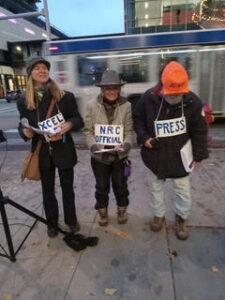
Xcel activists stage an impromptu play mocking the NRC, local media, and Xcel executives for the delay in informing the public of tritium leaks (Photo/Clint Combs)
BY CLINT COMBS
On Nov. 21, 2024, Whitney Wildman and George W. Crocker were among the speakers at a protest outside Xcel Energy’s offices at 401 Nicollet Mall in Minneapolis. The protest was organized by a coalition of groups including Women Against Military Madness, Indigenous Earth Protectors, Nukewatch, and the Coalition for a Nuclear-Free Mississippi River. The demonstration called attention to Xcel Energy’s environmental violations – particularly the ongoing tritium contamination from the Monticello Nuclear Plant – and demanded stronger accountability and action to protect local communities and waterways.
The Monticello Nuclear Generating Plant, located in Minnesota, is in hot water for violating environmental regulations due to its discharge of excessive levels of tritium into nearby water sources, and delayed informing the public for four months after first notifying state regulators months earlier. Tritium, a radioactive isotope of hydrogen, is routinely created in nuclear power generation and can pose significant risks to the environment and public health if not properly managed. The plant’s ongoing issues with tritium emissions have raised concerns about the potential long-term effects on the local ecosystem and drinking water safety.

Whitney Wildman of the Climate Justice Committee holds a sign (Photo/Clint Combs)
The Minnesota Department of Health has made clear the risks posed by tritium contamination, citing the Environmental Protection Agency’s (EPA) Safe Drinking Water Act limits. According to the MN Department of Health website, the EPA sets a limit of 4 millirems per year for tritium exposure through drinking water, which corresponds to a concentration of 20,000 picocuries per liter (pCi/L). Levels exceeding this threshold can lead to harmful radiation exposure for people consuming contaminated water over extended periods.
While tritium exposure in small amounts might not pose an immediate danger, long-term exposure to elevated levels of the radioactive substance can result in increased risks of cancer, genetic mutations, and other health issues. When tritium enters water supplies, it can be consumed directly by humans or enter the food chain through aquatic life. Over time, its radioactive properties can accumulate in the body, increasing the chances of cellular damage and illness.
The Safe Drinking Water Act is in place to protect the public from these risks, ensuring that tritium levels remain within safe limits. The Monticello plant’s violation of these standards underscores the challenges faced in regulating nuclear power plants and holding them accountable for their environmental impact.

Activists tying themselves up in front of Xcel HQ during an impromptu play (Photo/Clint Combs)
The Call for Action and Accountability
Whitney Wildman of the Climate Justice Committee has drawn comparisons between the Monticello Nuclear Plant’s environmental violations and other industrial pollution issues in Minnesota.
“These companies plan to exploit the land and its people to their breaking point, all in the name of profits,” Wildman said. “The Climate Justice Committee sees this in east side St. Paul, where we’re holding Northern Iron and Machine accountable for their heinous poisoning of the east side neighborhood.”
She further emphasized the severity of environmental abuses, noting the ongoing violations by other companies. Smith Foundry, an iron manufacturer in the East Phillips neighborhood, announced it was shutting down operations citing difficulties in applying for new permits with the Minnesota Pollution Control Agency. This came amid pressure from environmental activists outraged over a federal report that the factory emitted lead well above standards. A foul odor hangs over the Circulo de Amigos Child Care Center, just blocks from the foundry.
“Northern Iron has been operating in serious violation of the Clean Air Act on multiple counts, creating unsafe living conditions for the east side community.”
Wildman also criticized the practices of industries that prioritize profits over environmental and public health.

Protestors holding a sign (Photo/Clint Combs)
“Earlier this year, the Minnesota Pollution Control Agency ordered Northern Iron to cut its hours and product output to reduce pollution,” Wildman said. “When arguing in court to be able to continue business as usual, Northern Iron argued that adding environmental protections would be too costly for them to continue operating.”
In her remarks, Wildman made it clear that such attitudes are not unique to local factories, but extend to larger corporations like Xcel Energy, which owns the Monticello Nuclear Plant.
“They came right out and said that they believe it is correct to pollute our communities if it generates profits for the company. And what we see with Northern Iron is not some isolated issue,” Wildman said. “Monticello Nuclear Plant is no different. A major company like Xcel cannot be trusted to pay for the infrastructure changes needed to keep the plant from poisoning our beloved Mississippi River.”
The protesters rallied to demand that Xcel Energy cease operations to stop the pollution from its nuclear operations and ensure that the Mississippi River, a vital water source, is protected from further contamination.
Environmental experts have also weighed in on the situation, expressing deep concern over both the environmental and economic implications of nuclear operations. George W. Crocker, Executive Director of the North American Water Office in Lake Elmo, MN, has been particularly outspoken about the Monticello plant and Xcel Energy’s practices.
Crocker is known for his colorful and provocative commentary on corporate behavior. He used a highly charged moral analogy, drawing a comparison between Xcel Energy’s business practices and alleged sexual misconduct by former U.S. House Rep. Matt Gaetz, who later pulled his nomination for U.S. Attorney General after CNN asked the embattled congressman about an additional allegation involving a 17-year-old. Crocker’s quote underscored his view of Xcel’s unethical behavior in stark terms: “It’s hard to know where to start with these guys. They run Xcel Energy like an addicted child molester would run the attorney general’s office.”
Crocker’s use of this analogy was intended to emphasize what he perceives as a morally bankrupt, exploitative approach by Xcel Energy, similar to the alleged misconduct in Gaetz’s actions. He views both as examples of powerful figures and organizations abusing their authority for personal gain, without regard for the harm they cause to vulnerable communities. By making this comparison, Crocker underscores the predatory nature of Xcel’s corporate practices, which he argues prioritize profits at the expense of public health and environmental protection.

An activist holds a sign (Photo/Clint Combs)
Crocker continued by pointing out the company’s incentives to pollute in ways that accelerate climate change, arguing that Xcel Energy’s business model thrives on pollution: “For example, Xcel Energy makes more money when it makes more pollution that is accelerating climate chaos.”
He also accused the company of neglecting the necessary infrastructure to support local communities, instead prioritizing costly and inefficient power lines that benefit corporate interests: “They neglect lower transmission infrastructure and build the biggest, most expensive power lines first and get the public to pay for it,” Crocker said. “Because that way Xcel and its valves and industry partners get to preserve their precious market share. They get to continue extracting wealth produced by the community for their own private corporate office.”
Crocker argued that a focus on local renewable energy solutions would be far more beneficial for both the economy and the environment, stressing the need for a shift in priorities: “But it would be so much, so much cheaper, far more beneficial for local economies to acquire transmission infrastructure that serves local communities with locally produced renewable energy,” Crocker said.
Crocker also expressed concern over the continued operation of the Monticello Nuclear Plant, particularly as Xcel Energy plans to extend its nuclear operations until 2050: “We’re here today because Xcel Energy wants to continue nuclear operations until 2050. And that is a really bad idea for a long list of reasons,” Crocker said.
He highlighted the dangers posed by the plant’s aging infrastructure and the ongoing environmental failures, referencing the serious issues with the plant’s operations: “There is failure like what’s been going on now, after the place corroded into pieces and almost a million gallons of radioactive tritium leaked into the environment,” Crocker said.
The Monticello Nuclear Plant doesn’t seem concerned with public trust or environmental standards amid lax regulatory efforts by the Nuclear Regulatory Commission (NRC).
The area surrounding the plant is home to several threatened and endangered species, including some that are federally listed by the U.S. Fish and Wildlife Service. According to the latest environmental report from the NRC, three species in the region are classified as endangered, threatened, or candidates for federal listing. Two of these species are aquatic, and all are vulnerable to the plant’s potential environmental risks, particularly tritium contamination.
The following species are of particular concern:
Eastern Spotted Skunk: A state-listed threatened mammal, the eastern spotted skunk (also known as the civet cat) has experienced a rapid population decline, with only a few sightings recorded in Minnesota in recent decades. Although no occurrences of the eastern spotted skunk have been reported on or near the Monticello site, riparian woodlands and brush habitats on the site could provide suitable habitats for the species.
Blanding’s Turtle: A state-listed threatened species, the Blanding’s turtle is found in the Mississippi River and surrounding wetlands, which are located on or near the Monticello site. The NRC’s report indicates that there have been 20 observed instances of Blanding’s turtles within a 6-mile radius of the plant.
Rock Sandwort: This state-listed threatened plant species has been observed in the vicinity of the Monticello site. The rock sandwort typically grows in dry, sparsely vegetated sites such as the shallow cracks and crevices of sedimentary rock outcrops, which could be present on the Monticello site.























I heard Donnie is going to allow targeting of people who protest and cause a nuisance. Have fun!!